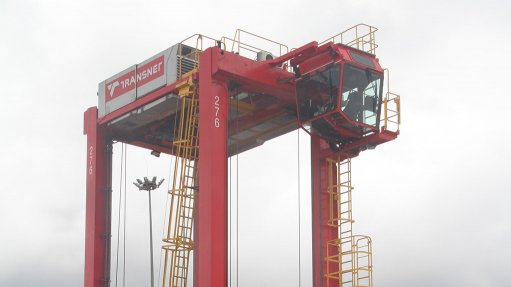
One of 23 straddle carriers unveiled at Pier 2 in Durban being put through its paces
State-owned freight transport company Transnet Port Terminals (TPT) on Tuesday unveiled 23 locally assembled diesel-electric straddle carriers at the Durban Container Terminal Pier 2, marking an important milestone in fostering local procurement and laying the foundation to supply cargo handling equipment to the rest of Africa.
Speaking at the event, Transnet CEO Siyabonga Gama said that the newly completed straddle carriers marked an important turning point in the utility’s relationship with Finnish company Kalmar, a global leader in cargo-handling equipment.
Until 2016, the relationship had been purely “transactional”. Over the past 15 years, Kalmar has delivered 150 straddle carriers as well as 72 rubber-tyred gantry cranes to TPT.
The latest order, however, was based on significant investment in local procurement. The machine structures as well as the straddle carrier component kits were built in Durban by Transnet Engineering, in association with Kalmar.
According to Gama and Kalmar Southern Africa national sales manager Aman Kumrakan, this marked the first time that spreader beams, which automatically locate and lock the containers, were manufactured outside of Kalmar’s European supply chain.
These straddle carriers combine high performance and productivity with low maintenance and operating costs. Gama said that, while straddle carriers currently operating at Pier 2 handled 32 moves per crane hour, the new delivery would increase the handling to 40 moves per hour.
Gama added that projects such as this helped Transnet prevent capital flight from South Africa while ensuring that industrialisation took place.
“It is important for us that local content is promoted, that manufacturing takes place in our country and that skills can be developed, especially in new sectors,” he said, noting that this would help create both comparative and competitive advantage.
He added that he felt Transnet could contribute to boosting South Africa’s economy in the wake of the downgrade by ratings agencies. “Even with the ratings downgrade, there are opportunities. We can take advantage of the quagmire in which we find ourselves. Transnet has a lot of ideas about what we need to do to make sure that we don’t waste a good crisis,“ he said.
Central to this is developing strong relationships with original equipment manufacturers like Kalmar.
He noted that Transnet Engineering’s expertise would now be able to cut across port, rail, pipeline and road transportation and he was looking forward to seeing the first bus and truck designed and manufactured for African conditions.
He said that TPT was now taking a revised approach to procurement. The importance of agility and the reliability of components were now integral to ramping up efficiencies within the logistics space.
Gama noted that TPT was still trying to repair state-of-the-art equipment damaged during floods that had devastated the Port of Durban. However, components that had been ordered from overseas suppliers would take two to three months to reach local shores.
“That is the next target for Transnet Engineering. We need to become more self-sufficient and we can make that equipment here. We now have the machinery to do it,” he said.
Also speaking at the event, TPT CEO Nozipho Sithole said that the company was committed to looking after and maintaining the new straddle carriers. The life span was expected to increase from 40 000 to 45 000 hours. She said TPT was also committed to improving efficiencies that would compress the time ships spent in port.
Kumrakan said that the straddle carrier contract also included delivery of a straddle carrier simulator which recreated local conditions on Pier 2 for the training of drivers. It will be commissioned in January next year.